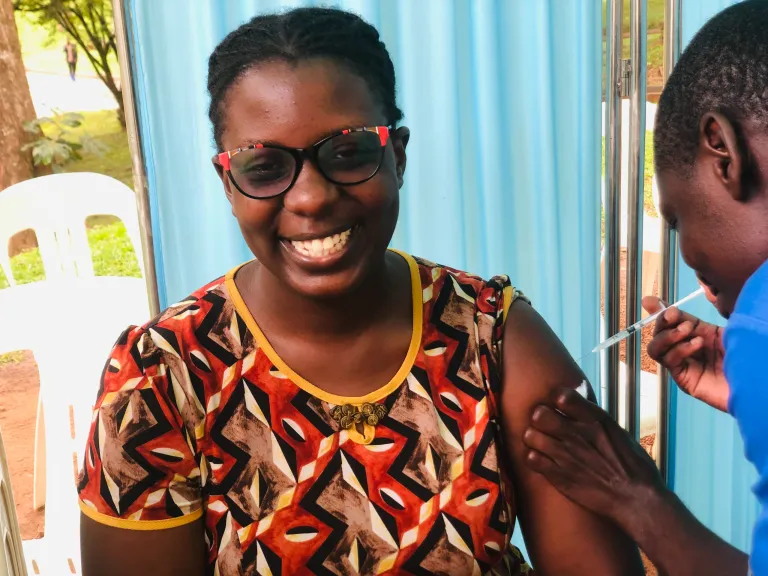By Irene Best Nyapendi
In April, Uganda underwent the second phase of a vaccination campaign against yellow fever disease that is spread through a bite from an infected Aedes mosquito, informally known as the “tiger” mosquito because of its black and white markings.
The campaign, which covered 53 districts, including Mukono, where the main campus of Uganda Christian University (UCU) is located, took place from April 2 to 8.
At the launch of the administration of the vaccination at Mehta Primary School in Lugazi Municipality, Buikwe District, on April 4, 2024, Dr. Yonas Tegegn Woldemariam, the Uganda representative with the World Health Organization (WHO), said they expected to reach at least 90% of the intended population in this second phase of the vaccination. The campaign targeted vaccinating 14.4 million people ages 1 to 60.

The first phase of the vaccination took place in June last year, targeting 13.3 million people. A total of 9.4 million people were reached during the first phase, according to Dr. Tegegn Woldemariam.
In 2017, a global strategy called Eliminate Yellow Fever Epidemics (EYE) was developed by WHO and a coalition of partners such as the United Nations International Children’s Emergency Fund (UNICEF) and Gavi, the Vaccine Alliance, to eradicate yellow fever by 2026. It is expected that by the end of 2026, almost 1 billion people ages 1-60 in high-risk African countries will be protected against yellow fever.
USA citizens over age 1 must have the yellow fever vaccination certificate to enter Uganda. Americans pay around $200 each for the yellow fever vaccine. Some other countries that require proof of yellow fever vaccination for entrance include Algeria, Angola, Australia, Bahamas, Nigeria and Kenya.
Since 2010, Uganda has had an escalating number of yellow fever outbreaks with confirmed cases reported in the northern parts of the country. In 2020, there were cases in parts of northwestern and western Uganda. Most recently, in 2023, yellow fever outbreaks were recorded in some central parts of the country.

According to WHO, a single dose of the yellow fever vaccine provides lifelong protection without any need for booster doses. A total of 80-100% of the vaccinated people are immune to the disease within 10 days and more than 99% within 30 days.
With some exceptions, the yellow fever vaccine is free only for Ugandan children less than a year old. For others, government health facilities charge Sh102,000 (about $27) per yellow fever vaccine.
The UCU Allan Galpin Health Centre was one of the facilities earmarked for free vaccination during the second phase in April. Abdul Wahabu Kakooza, a Nursing Officer in charge of vaccinations at Galpin, urged members of the community to embrace the vaccination. He said signs and symptoms of yellow fever may be confused with malaria, leptospirosis, viral hepatitis, other haemorrhagic fevers, infection with other flaviviruses (such as dengue), or poisoning.

According to Dr. Stephen Mulindwa, the Health Officer for Mukono District, 520,000 people were vaccinated in Mukono District. He urged more people to get vaccinated.
“People should beware that yellow fever can damage the liver and kidney, and this may lead to death,” Mulindwa said. “The vaccine is safe, and people should embrace it.”
In April, 1,000 students, staff and some community members were vaccinated at Allan Galpin.
Voices from the UCU Community
Esther Kisakye, a UCU year-three student pursuing a Bachelor of Science in Accounting and Finance, was among the first individuals to receive the yellow fever vaccination at Allan Galpin.
“I urge the public to get vaccinated to keep safe from yellow fever,” Kisakye said.

Emmanuel Isabirye, a Teaching Assistant at UCU who got vaccinated, believes that vaccines have helped combat diseases like polio. He emphasised that yellow fever is a severe illness and should be taken seriously.
Dickson Tumuramye, Head of the UCU Honors College, said that since the yellow fever vaccine is now mandatory for international travel, he was left with no choice but to comply.
“I saw the campaign as an opportunity to get a free vaccination,” Tumuramye said.
For his children, he gave consent for them to be vaccinated at their school.
“I realised that if we did not get vaccinated, it would potentially cause challenges in the future, such as when we want to travel or when schools start asking for vaccination cards,” he said.
On the other hand, some members of the UCU community believe the Uganda Ministry of Health could have done more awareness ahead of and during the administration for more-informed response.
“The Ministry of Health did not sensitise enough about the vaccine and its potential side effects,” said Eriah Lule, the Communications Assistant for the UCU Alumni Association, explaining some of the cause of vaccine hesitancy. Those side effects include headaches and low-grade fevers.
Hope Akello, a resident of Mukono district, did not get vaccinated, questioning the cost.
The Government ran advertisements in the media about the campaign. During the official launch of the weeklong campaign on April 4, the Permanent Secretary at Uganda’s Ministry of Health, Dr. Diana Atwine, urged the population to reject misinformation surrounding vaccines. She reassured the public of their safety and efficacy, emphasising that “immunisation efforts are crucial in safeguarding public health and reducing disease prevalence.”


